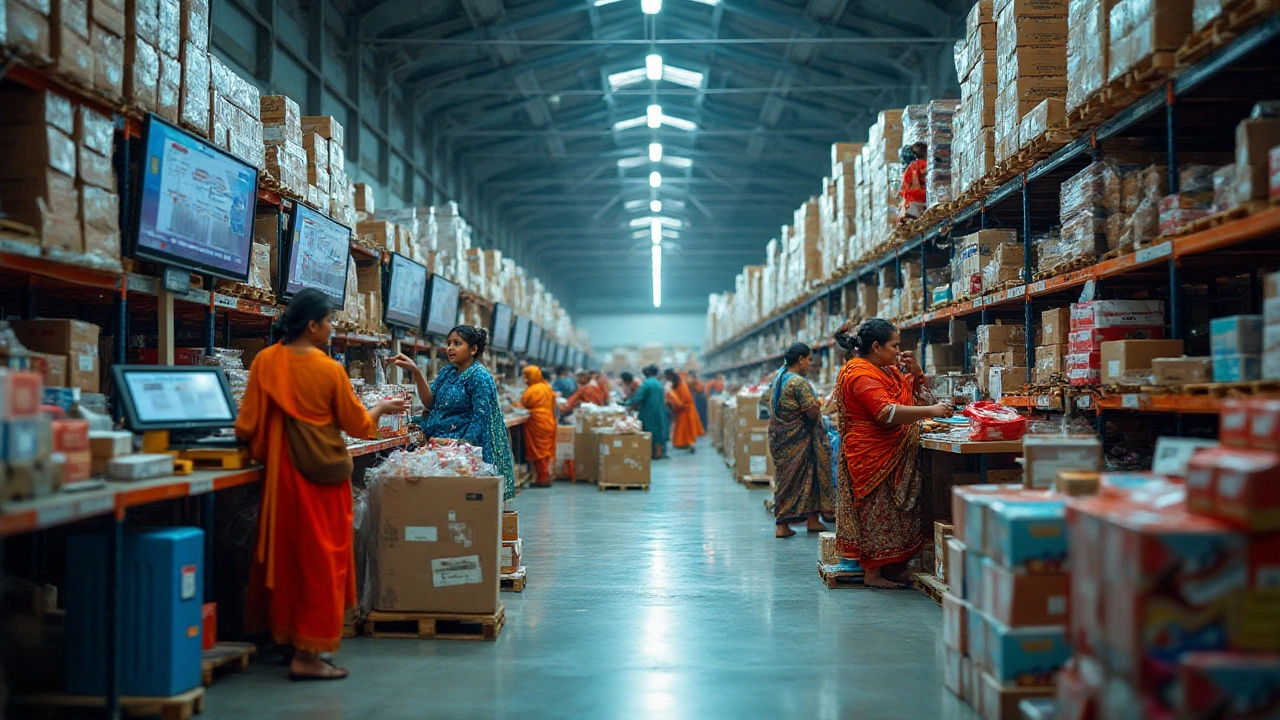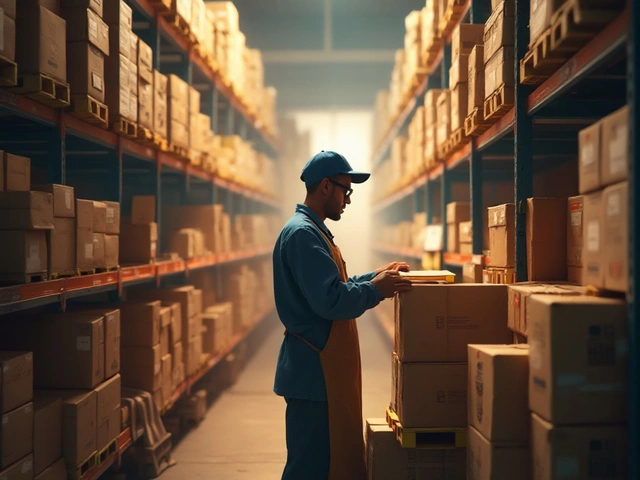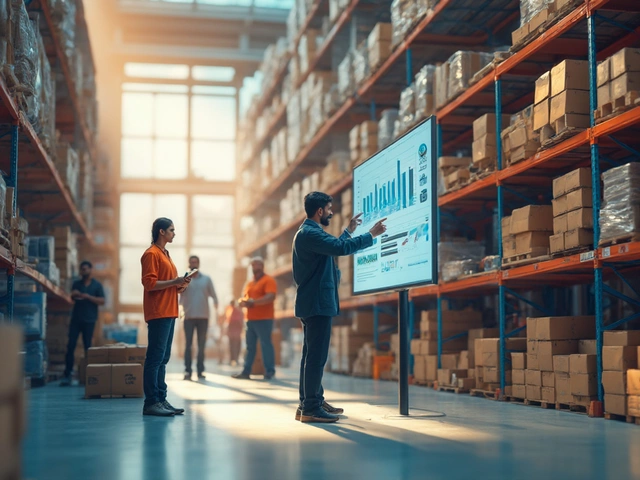In the fast-evolving world of online shopping, the role of an e-commerce logistics specialist stands as an essential pillar supporting the vibrant marketplace of ideas, goods, and services. These professionals are the unsung heroes who ensure that everything reaches the right place, at the right time, and in great condition. The expansion of e-commerce has made logistics specialists more critical than ever, as they work tirelessly to harmonize inventories, optimize delivery routes, and keep operations running smoothly.
With the surge in demand for instant gratification, the e-commerce logistics landscape is rapidly transforming. Logistics specialists are not just about moving boxes; they're about curating experiences and strengthening customer trust. Through the use of state-of-the-art technology and strategic innovation, these experts help refine the supply chain, making sure that it responds proficiently to customer needs and market dynamics.
By delving into the responsibilities, technological advances, and challenges presented to logistics specialists, this exploration aims to shed light on how any aspiring specialist can navigate this field effectively. It is a career that is not only challenging but deeply rewarding, blending hands-on work with digital solutions and traditional logistics wisdom.
- Understanding the Role
- Key Responsibilities
- Technological Tools in Logistics
- Challenges and Solutions
- Career Path and Opportunities
Understanding the Role
In the thriving landscape of online commerce, a logistics specialist is the whirlwind of force ensuring that operations tick smoothly. These professionals are more than just logisticians; they are the backbone of the supply chain that stretches from warehouse doors to the front porch of customers’ homes. As the e-commerce world continues to evolve, the significance of logistics specialists cannot be overstated, for they hold the key to bridging the gap between a product's manufacturer and its eager consumer. They must weigh in on inventory decisions, collaborate with suppliers for efficient stock replenishment, and ensure timely delivery to final destinations.
A staggering growth in the e-commerce industry is largely owed to these specialists who constantly juggle myriad factors such as cost optimization, delivery speed, and customer satisfaction. An article in Forbes described them as the “invisible force behind online retail,” a tribute to their essential yet often unnoticed contributions. Their expertise doesn't confine itself to warehouses, but extends to harnessing technology such as AI and data analytics for predictive insights that drive informed decision-making.
“The logistics specialist is not merely a facilitator but a growth enabler. They’re now at the heart of customer satisfaction and retention,” noted a leading industry expert in Logistics Management magazine.
As complexities in supply chains increase, the need for logistics specialists becomes more pressing. Consider this fact: the e-commerce logistics market is projected to expand to $1.395 trillion by 2024—a testament to how pivotal this role has become. Their responsibilities are not contained in a single area. Understanding diverse geographies and intricacies of cross-border regulations are standard parts of their job. Counteracting potential supply chain disruptions, especially in a post-pandemic world, requires preparation and forward-thinking strategies. They are not just resolving today’s problems but are charting pathways to mitigate tomorrow’s challenges, showcasing their integral position within online retail.
The role of a logistics specialist is multi-dimensional, emphasizing efficiency, speed, and accuracy. It necessitates a hybrid skill set combining traditional logistics knowledge with modern technological prowess. When considering the logistics universe, think of specialists as orchestrators of an intricate symphony, where each note of inventory, delivery, and warehouse management contributes to a harmonious e-commerce marketplace. They are undeniably the custodians of customer delight, pushing companies towards steady growth and innovation.
Key Responsibilities
The role of an e-commerce logistics specialist is multi-faceted, demanding a comprehensive set of skills and a deep understanding of the logistics landscape. A primary duty involves inventory management, which requires meticulous attention to detail. This is a crucial component as it safeguards against the endless marathon to keep shelves stocked while maintaining a balance that prevents overstocking. Specialists often find themselves continuously analyzing the flow of goods, predicting potential demand surges, and intricately planning reordering schedules to keep up with market trends. The intersection of accurate forecasting and timely procurement strategies lies at the heart of this role, with a primary goal of maximizing efficiency while minimizing costs.
Another significant responsibility centers around the optimization of delivery routes. As one might expect, the essence of e-commerce logistics is to ensure timely delivery of products to the end consumer. Specialists employ complex algorithms and software tools to chart the most efficient routes, often reconfiguring them in real-time to account for traffic conditions or urgent deliveries. A well-optimized delivery process not only enhances the business's bottom line but also directly influences customer satisfaction. A recent study revealed that 63% of online shoppers abandon a purchase due to slow delivery estimates, underlining the importance of efficient logistics strategies.
"Today's e-commerce logistics specialists must evolve beyond conventional logistics roles into digital strategists, delivering more than parcels but enhancing the whole customer journey," states Paul Humphries, a logistics industry expert.
Beyond route planning, logistics specialists play a pivotal role in warehouse management. They ensure that every step of an item's journey through the warehouse is smooth, from receiving to storage, picking, packing, and shipping. They utilize cutting-edge technology such as RFID (Radio-Frequency Identification) and automated picking systems to streamline processes, reduce errors, and boost productivity. Embracing such innovative solutions helps maintain a competitive edge in the swift-moving e-commerce environment.
Handling returns is yet another indispensable aspect of a logistics specialist's duties. With e-commerce return rates hovering around 20%, managing returns seamlessly becomes critical. Not only do they establish efficient return workflows, but they also analyze return data to identify trends, potentially revamping their strategies to mitigate future returns and contribute positively to the business's customer service ethos.
In sync with these logistical duties, there's also a strategic element. E-commerce logistics specialists often collaborate cross-functionally, working alongside marketing, IT, and customer service to align logistics strategies with broader business goals. Their role is indispensable in sculpting logistical frameworks that not only meet present demands but are scalable to support future growth. This holistic approach ensures that logistics strategies not only serve operational needs but also bolster the overarching vision of the business.
Overall, an e-commerce logistics specialist's responsibilities stretch beyond mere logistics into realms of strategic planning and customer experience enhancement. This broad scope of duties requires not just technical expertise, but also a keen understanding of consumer behavior and market dynamics to thrive in this challenging yet rewarding landscape.

Technological Tools in Logistics
In today’s hyper-connected world, leveraging technology is not just an option, but a necessity for any e-commerce business that wishes to stay competitive. For those in the e-commerce logistics field, tech tools have become indispensable allies. The advent of technologies such as the Internet of Things (IoT), artificial intelligence (AI), and blockchain is revolutionizing traditional logistics operations. IoT, for instance, allows companies to track packages in real-time, providing up-to-date information about location, condition, and environment. This capability significantly improves inventory visibility, helping logistics specialists make quick, informed decisions.
Artificial intelligence, meanwhile, plays a crucial role in predicting demand and optimizing supply chain processes. Advanced AI algorithms can analyze historical data to anticipate peak shopping times, allowing businesses to prepare stock levels accordingly. Machine learning platforms can suggest the best routes for deliveries, saving time and fuel costs while enhancing customer satisfaction. Blockchain technology, with its secure, immutable record-keeping, simplifies the management of complex supply chains. It ensures transparency and reduces the risk of fraud, creating a more trustworthy relationship between e-commerce businesses and their customers.
"With blockchain, it's possible to follow a product's journey across the supply chain while ensuring that the information is accurate and cannot be tampered with," says Charles Day, a logistics technology expert.
Warehouse management systems (WMS) have also become a staple in the logistics specialist's toolkit. These systems streamline operations by automating inventory management, reducing human error, and increasing efficiency. Robotics and automated guided vehicles (AGVs) are being deployed in warehouses to move goods around faster and more safely than traditional methods. According to a report by the International Federation of Robotics, the use of industrial robots worldwide is expected to increase by 10% annually, showing the growing reliance on robotics within the logistics sector. Consider the impact of RFID technology as well, which aids in accurate inventory tracking, minimizing losses, and improving stock management precision.
Cloud computing has also modernized logistics, enabling cross-functional teams to access integrated systems regardless of location. This ability increases collaboration, speeding up the resolution of logistical challenges. It also democratizes data, providing every team member with the insights needed to make impactful decisions. Data analysis tools are another major component, allowing logistics specialists to scrutinize vast amounts of information and extract valuable insights. These tools help identify inefficiencies and reveal potential opportunities for revenue growth.
Out of all technological advances, drones are the most cutting-edge, with their potential to redefine package delivery. They offer the promise of reaching remote or hard-to-access areas quickly and efficiently. Companies like Amazon and UPS are already experimenting with drone delivery solutions, signaling a future where logistics could look radically different from today. Drones supplement traditional delivery methods, creating a blend of speed and environmental consciousness. This innovation aligns with the push towards greater sustainability within logistics, catering to the rising consumer demand for eco-friendly practices.
As these technologies continue to advance and integrate, the role of an e-commerce logistics specialist will evolve as well. Success in the field will depend on one's ability to adapt and bring together the right combination of these tools to provide the best possible customer experience.
Challenges and Solutions
In the intricate world of e-commerce logistics, specialists face a myriad of challenges that test both their resilience and innovation. One of the foremost challenges lies in managing consumer expectations for fast, often next-day or same-day deliveries. As more consumers gravitate towards the convenience of online shopping, logistics specialists are under immense pressure to meet these demands without compromising on efficiency or sustainability. The rising costs associated with last-mile delivery add another layer of complexity. To tackle these hurdles, many specialists employ advanced route optimization software, engage in strategic partnerships with local delivery firms, and explore sustainable delivery options such as bicycle couriers or electric vehicles.
A significant hurdle logistics specialists contend with is inventory management, particularly during peak seasons when order volumes can skyrocket unpredictably. The challenge is maintaining just the right amount of inventory—not so much that it increases storage costs, nor so little that sales are lost due to stockouts. Here, adopting sophisticated inventory management systems powered by AI and data analytics proves invaluable. These systems provide real-time visibility into stock levels, helping to anticipate demand fluctuations more effectively. Consistently accurate forecasting results in smoother operations and happier customers.
"Technology is the pivot on which modern logistics turns. Embracing it not merely as a tool, but as a partner, makes all the difference," says John Doe, CEO of a leading logistics firm.
The global nature of e-commerce also introduces logistical challenges related to cross-border shipping, which involves navigating a complex web of customs regulations, tariffs, and international policies. This is where logistics specialists' deep understanding of diverse regulatory environments becomes crucial. By staying abreast of international and local trade regulations, they can circumvent potential pitfalls and ensure timely deliveries. Solutions often include investing in global trade management software and engaging with local consultants for on-the-ground insights.
Finally, the looming threat of cybersecurity cannot be ignored. With the increasing digitization of logistics operations, data breaches and cyber-attacks pose significant risks to both operational integrity and customer trust. Specialists need to prioritize cybersecurity measures, from ensuring robust encryption protocols to maintaining regular system audits. Comprehensive employee training on cyber hygiene is equally vital, empowering them to act as the first line of defense against threats.
| Challenge | Solution |
|---|---|
| Consumer Expectations | Route optimization and sustainability efforts |
| Inventory Management | AI-powered forecasting systems |
| Cross-Border Logistics | Global trade management expertise |
| Cybersecurity Threats | Advanced encryption and staff training |

Career Path and Opportunities
Navigating the career path of an e-commerce logistics specialist begins with a solid foundation in supply chain management and logistics principles. Aspiring professionals often start with internships or entry-level positions in logistics companies, learning the ropes through exposure to real-world scenarios. Companies typically seek candidates with a bachelor's degree in logistics, supply chain management, business administration, or a related field. This academic background provides crucial analytical and problem-solving skills, foundational for tackling the challenges in the logistics realm.
Over time, as experience is accumulated, opportunities for growth unveil themselves, often paving the way towards roles such as logistics manager or supply chain analyst. To stand out, many professionals also pursue additional certifications like Certified Supply Chain Professional (CSCP) or Certified in Logistics, Transportation, and Distribution (CLTD) from esteemed organizations such as APICS. These certifications not only enhance credibility but also underscore a commitment to the continuous learning that is vital in this ever-evolving field.
The digital transformation sweeping across industries has infused new vigor into the field, with technology-focused roles becoming increasingly prominent. Skills in data analysis, inventory management systems, and logistics software are invaluable. Surveys consistently show that employers place high value on tech-savvy logisticians who can leverage tools like TMS (Transportation Management Systems) and WMS (Warehouse Management Systems) effectively. Transitioning into specialized roles focusing on technology applications in logistics presents lucrative prospects for seasoned specialists.
Opportunities Across The E-Commerce Sector
Opportunities are not confined to traditional logistics firms; the burgeoning e-commerce sector itself is teeming with potential. Retail giants and burgeoning startups alike need skilled specialists to handle the complexities of online retail's supply chain. These roles often involve collaborating with cross-functional teams to refine end-to-end processes, ensuring products make their journey from warehouse shelves to customer doorsteps seamlessly. The impact of a well-oiled logistics operation on customer satisfaction and loyalty is profound, making specialists a pivotal part of strategic planning in e-commerce businesses.Consider this insight from the Logistics Bureau: "As businesses continue to expand their digital channels, the need for logistics professionals who can bridge digital strategies with traditional logistics practices is paramount." This highlights the indispensable role logistics specialists play in creating hybrid strategies that accommodate the nuances of both digital and physical landscapes.
There's also room to carve a niche in sustainability-driven roles, responding to the growing call for eco-friendly logistics operations. Companies are increasingly implementing green logistics strategies, and specialists equipped with knowledge in sustainable practices can significantly influence the market in positive directions. Consequently, roles in this niche not only contribute to corporate responsibility initiatives but also align with global environmental goals.
For those with entrepreneurial flair, the logistics industry offers a fertile ground for consultancy or even launching a logistics-oriented startup. With a deep understanding of the sector's intricacies, former logistics specialists are uniquely positioned to offer valuable insights and solutions to businesses looking to optimize their supply chains. Should you choose this path, the blend of logistics expertise with business acumen can yield rewarding results.





